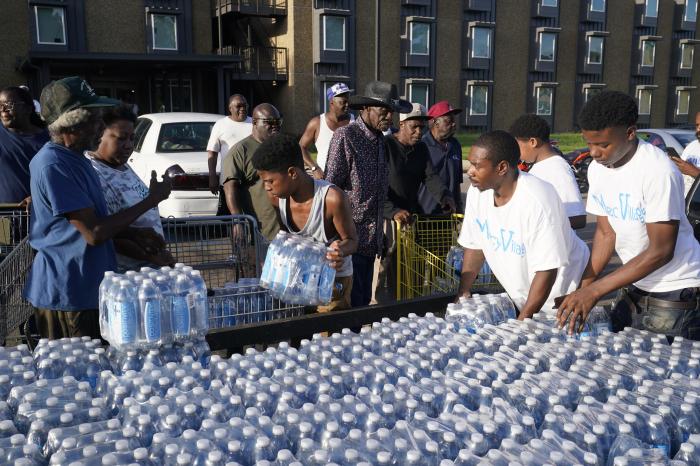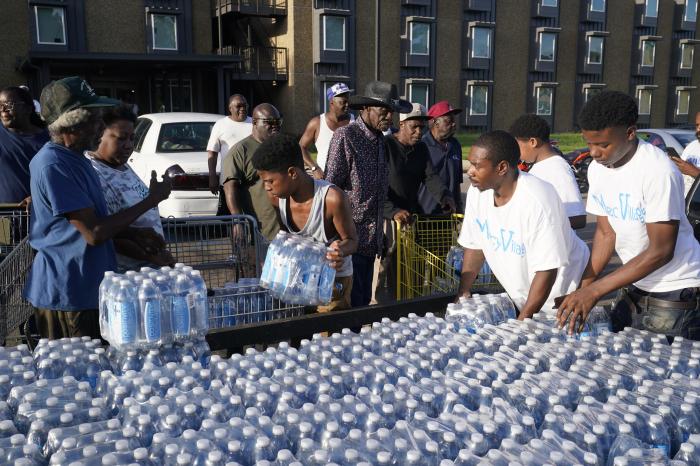
How Jackson, Mississippi Ran Out of Water: A Crisis Unfolding
How jackson mississippi ran out of water – How Jackson, Mississippi ran out of water is a story that has captivated the nation, highlighting the vulnerability of aging infrastructure and the devastating impact of a failing water system. Imagine a city where residents wake up to find their taps running dry, their lives upended by a lack of access to this essential resource.
This is the reality that Jackson residents have faced, and it’s a situation that has exposed deep-rooted issues within the city’s water infrastructure and the broader socioeconomic landscape.
The crisis in Jackson is not a sudden event but a culmination of decades of neglect, underfunding, and a complex web of factors. From aging pipes to a struggling water treatment plant, the city’s water system has been slowly deteriorating, leaving it vulnerable to failures and disruptions.
This situation has been exacerbated by a lack of resources, environmental challenges, and the impact of climate change, all contributing to a perfect storm that has left residents grappling with the consequences.
The Water Crisis in Jackson, Mississippi

Jackson, Mississippi, has faced a long-standing water crisis, marked by a series of boil-water notices and outages, culminating in a city-wide emergency in August 2022. This crisis exposed the fragility of the city’s water infrastructure and the dire consequences of systemic neglect.
The Historical Context of Jackson’s Water Infrastructure
Jackson’s water system has a long history, dating back to the early 20th century. The city’s water infrastructure was built during a period of rapid growth and industrialization, and it has been struggling to keep up with the demands of a growing population and aging infrastructure.
The city’s water system is a complex network of pipes, pumps, and treatment plants, and it has been plagued by leaks, breaks, and corrosion for decades.
Factors Contributing to the Water Crisis
Several factors have contributed to the recent water crisis in Jackson, including:
- Aging Infrastructure:Jackson’s water system is over 100 years old, and many of its pipes are made of cast iron, which is prone to corrosion and leaks. The city has struggled to keep up with necessary repairs and upgrades, leading to a decline in the overall condition of the water system.
- Funding Shortages:Jackson has faced chronic funding shortages, making it difficult to invest in infrastructure improvements. The city’s poverty rate is high, and its tax base is relatively weak, making it difficult to generate sufficient revenue for infrastructure projects. In 2017, a $2.3 billion plan was proposed to address the water crisis, but it was never fully funded.
- Environmental Factors:The city’s water system is also vulnerable to environmental factors, such as extreme weather events. In recent years, Jackson has experienced several major floods, which have damaged the city’s water infrastructure and contaminated the water supply.
The Impact of the Water Crisis
The water crisis in Jackson has had a devastating impact on residents, businesses, and the city’s overall functioning:
- Residents:Residents have been forced to boil their water for drinking, cooking, and bathing, which is a major inconvenience and health risk. Many residents have also experienced water outages, leaving them without access to clean water for days or even weeks.
The water crisis in Jackson, Mississippi, highlights the fragility of our infrastructure and the urgent need for investment. It’s a stark reminder that basic necessities like clean water can be taken for granted. Meanwhile, a different kind of crisis is unfolding as ESPN and Disney go dark for millions of DirecTV customers amid a contract dispute , leaving many sports fans in the dark.
Both situations illustrate the importance of reliable systems and the consequences when they fail, whether it’s the water we drink or the entertainment we enjoy.
- Businesses:The water crisis has also had a major impact on businesses in Jackson. Restaurants and other businesses have been forced to close temporarily due to lack of water. Some businesses have been forced to relocate or shut down permanently, resulting in job losses and economic hardship.
- City’s Functioning:The water crisis has also disrupted the city’s overall functioning. Schools have been closed, and city services have been disrupted. The crisis has also strained the city’s budget, as it has been forced to spend millions of dollars on emergency repairs and water distribution.
Causes of the Water Crisis: How Jackson Mississippi Ran Out Of Water
The water crisis in Jackson, Mississippi, is a complex issue with roots in decades of neglect, underfunding, and a confluence of factors that have created a fragile and vulnerable water system.
The State of Jackson’s Water Treatment Plant and Distribution System
The city’s water treatment plant and distribution system have been plagued by a multitude of problems, contributing to the current crisis. These include:
- Aging Infrastructure:The water treatment plant and distribution system are aging and in need of significant upgrades. Pipes are corroded and prone to leaks, and the plant itself requires modernizations to improve efficiency and reliability.
- Lack of Maintenance:Years of underfunding and inadequate maintenance have left the system vulnerable to breakdowns and failures. The plant has experienced a series of breakdowns, including issues with pumps, filters, and chemical treatment processes.
- Operational Challenges:The plant has faced operational challenges, including staffing shortages and difficulties in maintaining proper water pressure. These challenges have further exacerbated the issues with the aging infrastructure and lack of maintenance.
The Role of the Mississippi River in Water Supply
Jackson’s water supply is heavily reliant on the Mississippi River. The river is vulnerable to flooding and pollution, which can significantly impact the city’s water quality.
- Flooding:The Mississippi River is prone to flooding, particularly during heavy rainfall events. Floods can contaminate the river water with sewage, industrial waste, and other pollutants.
- Pollution:The Mississippi River is a major waterway that receives runoff from agricultural, industrial, and urban areas. This runoff can contain fertilizers, pesticides, heavy metals, and other contaminants that can compromise the safety of the water supply.
The Impact of Climate Change on Water Resources
Climate change is exacerbating the water crisis in Jackson and other communities across the country.
It’s crazy to think that Jackson, Mississippi, ran out of water, a basic necessity for life. It makes you wonder what else is going wrong in the world. Meanwhile, according to this article , Hawaii is the happiest state in America, even though California and Florida didn’t make the top 10.
Maybe the folks in Hawaii have a secret to happiness that Jackson could learn from. After all, you can’t be happy without clean water, can you?
- Increased Rainfall Variability:Climate change is causing more extreme weather events, including heavy rainfall and droughts. These events can strain water systems and lead to water shortages or contamination.
- Rising Temperatures:Rising temperatures can increase evaporation rates and reduce water availability. This can put additional stress on water systems and lead to water shortages.
Responses to the Water Crisis
The water crisis in Jackson, Mississippi, sparked immediate and widespread responses from local, state, and federal authorities. These responses aimed to provide immediate relief to residents while addressing the underlying issues that contributed to the crisis.
Immediate Response Efforts
The immediate response to the water crisis in Jackson involved a multifaceted approach, encompassing emergency measures, resource allocation, and public health initiatives.
- Emergency Water Distribution:The city of Jackson, along with the state of Mississippi and the Federal Emergency Management Agency (FEMA), established numerous water distribution points across the city. These points provided residents with bottled water, water filters, and other essential supplies. The Mississippi National Guard was deployed to assist with the distribution efforts.
The water crisis in Jackson, Mississippi, highlights the fragility of our infrastructure, and reminds us that even basic necessities can be taken for granted. While we grapple with this issue, there’s a fascinating new study out, weight loss drugs cut covid 19 deaths study finds , suggesting potential solutions to another pressing problem.
Perhaps these unexpected discoveries can inspire us to find innovative solutions to the challenges facing Jackson and other communities around the world.
- Water System Repairs:The city of Jackson, with assistance from the state and federal governments, initiated immediate repairs to the city’s aging water infrastructure. These repairs included addressing leaks, replacing damaged pipes, and improving water treatment facilities.
- Public Health Measures:The Mississippi Department of Health (MSDH) issued boil water advisories and provided guidance on safe water usage during the crisis. Public health officials conducted outreach programs to educate residents on the potential health risks associated with contaminated water and the importance of hygiene practices.
Effectiveness of Emergency Measures
While the emergency measures taken during the water crisis provided immediate relief to residents, their effectiveness in addressing the underlying issues was limited.
- Temporary Solutions:The water distribution points and system repairs addressed the immediate need for clean water, but they were temporary solutions. The aging infrastructure remained a significant concern, requiring long-term investments and comprehensive solutions.
- Limited Reach:The distribution of water and other resources did not reach all residents equally. Some communities experienced difficulties accessing these resources due to limited transportation or other barriers.
- Public Health Concerns:The boil water advisories and public health measures were crucial in mitigating the risks of contaminated water. However, these measures could not fully address the long-term health consequences of prolonged exposure to contaminated water.
Long-Term Plans and Initiatives
Recognizing the need for sustainable solutions, the city of Jackson, in collaboration with state and federal agencies, developed long-term plans to address the underlying issues that led to the water crisis.
- Infrastructure Upgrades:The city of Jackson embarked on a multi-year infrastructure upgrade program, with the goal of replacing aging pipes, improving water treatment facilities, and strengthening the overall water system. This program is expected to require significant funding and involve multiple phases of construction.
- Financial Assistance:The federal government provided financial assistance to the city of Jackson to support infrastructure upgrades and other long-term solutions. These funds are intended to address the immediate needs while also investing in the future resilience of the water system.
- Community Engagement:Recognizing the importance of community involvement, the city of Jackson established community outreach programs to engage residents in the planning and implementation of long-term solutions. These programs aim to ensure that the needs and concerns of all residents are considered in the development of sustainable water infrastructure.
Socioeconomic Impact
The water crisis in Jackson, Mississippi, has had a profound and multifaceted impact on the city’s residents, businesses, and overall economy. The lack of access to clean and safe water has exacerbated existing inequalities and created new challenges for the city’s recovery.
Public Health Implications
The lack of access to safe water has posed a significant threat to public health in Jackson. The city’s aging infrastructure, coupled with the lack of investment in maintenance and repairs, has led to widespread contamination of the water supply.
This has resulted in a surge in waterborne illnesses, including gastrointestinal issues, skin infections, and respiratory problems. The city’s residents, particularly those in low-income neighborhoods, have been disproportionately affected by the crisis, as they lack the resources to purchase bottled water or access alternative sources of clean water.
Lessons Learned and Future Solutions
The Jackson water crisis serves as a stark reminder of the fragility of our water infrastructure and the urgent need for comprehensive solutions. This event has exposed systemic issues and highlighted the importance of proactive planning, robust infrastructure, and equitable access to clean water.
It is imperative that we learn from this crisis and implement measures to prevent similar situations from occurring in the future.
Investing in Infrastructure, How jackson mississippi ran out of water
Investing in infrastructure is crucial for ensuring a reliable water supply. The crisis in Jackson underscored the need for significant investments in water treatment plants, distribution systems, and aging pipes. Many cities across the United States face similar infrastructure challenges, and a proactive approach to addressing these issues is essential.
- Modernize Water Treatment Plants:Aging water treatment plants are often ill-equipped to handle fluctuations in water demand or respond to extreme weather events. Investing in modernizing these facilities can improve water quality and ensure reliable treatment.
- Upgrade Distribution Systems:Leaky pipes and aging infrastructure can lead to significant water loss and contamination. Upgrading distribution systems with leak detection technologies and replacing aging pipes can improve efficiency and reduce water loss.
- Implement Leak Detection and Repair Programs:Proactive leak detection and repair programs are essential for minimizing water loss and ensuring the integrity of water systems. Cities should invest in advanced leak detection technologies and implement comprehensive repair programs.
Strengthening Water Management Practices
Effective water management practices are essential for ensuring a sustainable water supply. This includes optimizing water usage, implementing water conservation measures, and managing water resources responsibly.
- Promote Water Conservation:Implementing water conservation programs and educating residents about water-saving techniques can reduce overall water demand and strain on water systems. Examples include using low-flow fixtures, watering lawns efficiently, and reducing water usage during peak hours.
- Develop Drought Management Plans:Proactive drought management plans are essential for mitigating the impact of water shortages. These plans should include strategies for reducing water consumption, managing water reserves, and ensuring equitable access to water during drought conditions.
- Invest in Water Storage and Reuse Technologies:Investing in water storage and reuse technologies can help ensure a reliable water supply during periods of drought or high demand. This includes building reservoirs, implementing water recycling programs, and exploring alternative water sources like rainwater harvesting.
Collaborative Approach to Water Security
Addressing water challenges requires a collaborative approach involving government agencies, private sector entities, and community stakeholders.
- Government Leadership and Funding:Government agencies play a crucial role in developing and implementing water infrastructure projects, providing funding for water-related initiatives, and establishing regulations to ensure water quality and safety.
- Private Sector Innovation and Investment:The private sector can contribute to water security by investing in innovative technologies, developing water-efficient products, and providing technical expertise.
- Community Engagement and Education:Engaging communities in water management decisions and educating residents about water conservation and water quality issues is essential for fostering a sense of ownership and promoting responsible water use.






